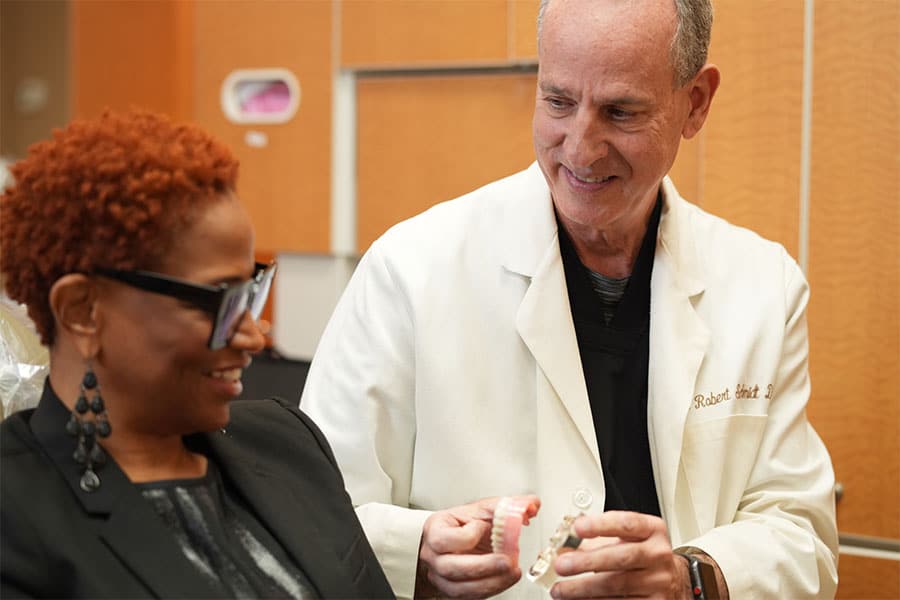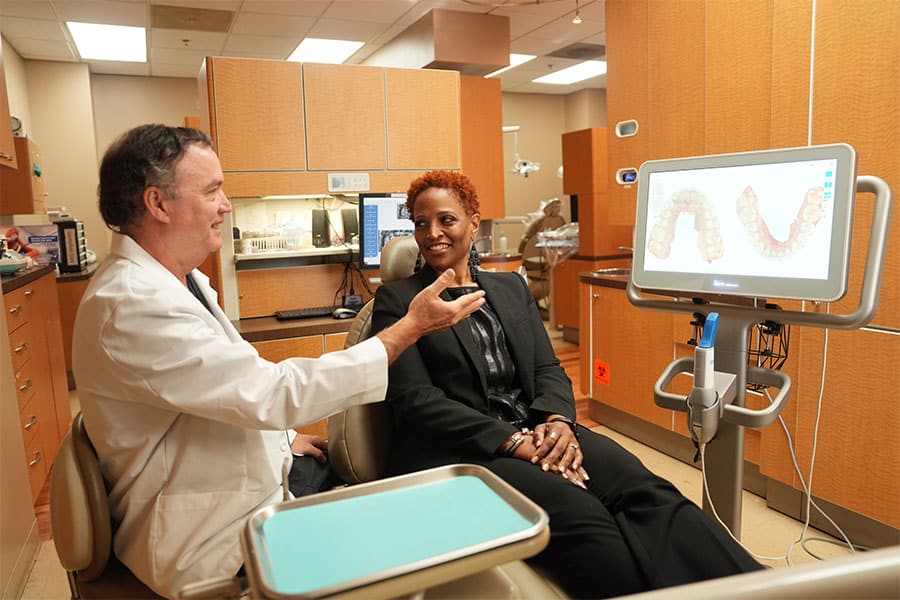- New Patient Special
- Serving the Atlanta Metro and Midtown Area since 1982
- (404) 600-1446
If you’re seeking a solution that mimics the appearance and feel of natural teeth, consider dental implants. Typically made from titanium, these implants replace the root of a missing tooth. Moreover, replacement teeth are securely placed on the implant, providing a natural, durable, and aesthetically pleasing solution for your missing teeth.

At Atlanta Dental Center, located in Atlanta, GA, our team of highly skilled dental professionals excels in providing top-notch dental implant care. As a result, our implants have a high success rate, offering a reliable and long-lasting solution for missing teeth. Furthermore, we ensure that each procedure meets the highest standards of quality and care.
Research shows that dental implant procedures have a success rate exceeding 95%. However, the success rate can vary based on factors such as your oral health, the specific location of the implant, and the expertise of your dentist. Fortunately, our team at Atlanta Dental Center has the experience and skills needed to maximize your implant success.

We understand that cost is a significant factor when considering dental implants. Therefore, we offer various financing options and accept most insurance plans to make dental implants more affordable. Additionally, our flexible payment plans are designed to ease the financial burden and provide access to top-quality dental care.
At Atlanta Dental Center, we stay abreast of the latest advancements in implant dentistry to deliver exceptional care. As a result, you can trust our skilled team to help you regain your confidence and achieve the stunning, healthy smile you’ve always desired.

Dental implants provide a secure foundation for your replacement teeth. Consequently, they offer superior comfort and function compared to traditional dentures. Additionally, this stability makes daily activities like eating and speaking easier.
Dental implants provide a distinct advantage over removable dentures when it comes to speech. Therefore, you can speak clearly and confidently without worrying about slippage. Furthermore, the improved fit of implants aids in more natural conversations.
Dental implants are advantageous because they do not require altering adjacent teeth, unlike traditional bridges. Thus, they help preserve your oral health more effectively. Additionally, they prevent potential damage to neighboring teeth.
Implants closely resemble your natural teeth. As a result, they enhance the aesthetic appeal of your smile and boost your self-confidence. Moreover, you can enjoy a natural-looking smile that compliments your appearance.

Don’t let missing teeth or uncomfortable dentures hold you back. Contact Atlanta Dental Center today to explore our dental implant options and schedule a consultation with our experts. Let us assist you in achieving the beautiful smile you’ve always wanted!

Satisfied Client
"I had tiny cracks in my front two teeth. The doctor was so friendly and accommodating throughout the whole process. She wanted my teeth to look perfect—up to my standards. The staff fit me in when it was convenient for me. My teeth look and feel amazing now! I have more confidence, a brighter smile and more ease of eating.”
Satisfied Client
"I am very impressed with the treatment and the follow-up and care after the work is done. What I liked best was the beautiful smile after all the work was done. I have a trouble-free smile that has brought me numerous compliments and is very functional. It has basically given more confidence and I can eat most anything I want to eat.”
Satisfied Client
"If I ever moved, I think I would fly here for my dentistry! It has a lot to do with how expert the dentists are. They do the injection in the exact area. Unlike in the past, people can’t even tell when I have been to the dentist as my lip where I had the injection looks completely normal"
Satisfied Client
"I had a terrible toothache over the weekend and called Atlanta Dental Center first thing Monday morning. They got me in right away, and the dentist was so gentle and thorough. I left pain-free and very grateful!"
Satisfied Client
“I was always self-conscious about my gummy smile, but after just one laser treatment, my confidence soared. The procedure was quick and painless, the results are fantastic!”
Satisfied Client
“The laser gum treatment at Atlanta Dental Center was a game-changer for me. No pain, no stitches, and I love my new smile!”
Satisfied Client
"I used to wake up feeling exhausted every morning, no matter how long I slept. After getting my oral appliance from Atlanta Dental Center, I’m finally getting the restful sleep I need. I feel more energetic and alert during the day, and my snoring has stopped completely. Thank you!"
Satisfied Client
"I had a terrible toothache over the weekend and called Atlanta Dental Center first thing Monday morning. They got me in right away, and the dentist was so gentle and thorough. I left pain-free and very grateful!"
Satisfied Client
"When my son knocked out his front tooth during a soccer game, we rushed to Atlanta Dental Center. The team was amazing—they reinserted the tooth, and my son is doing great now. I can’t thank them enough!"
Satisfied Client
"Fastbraces® changed my life—I saw results in just 4 months! I couldn’t be happier with my new smile."
Satisfied Client

"I needed to replace three teeth and was told that the best way to go would be with dental implants. At first I thought, ‘they’re going to drill into my jawbone.’ But actually it was so precise that it ended up being a quick and very comfortable procedure."